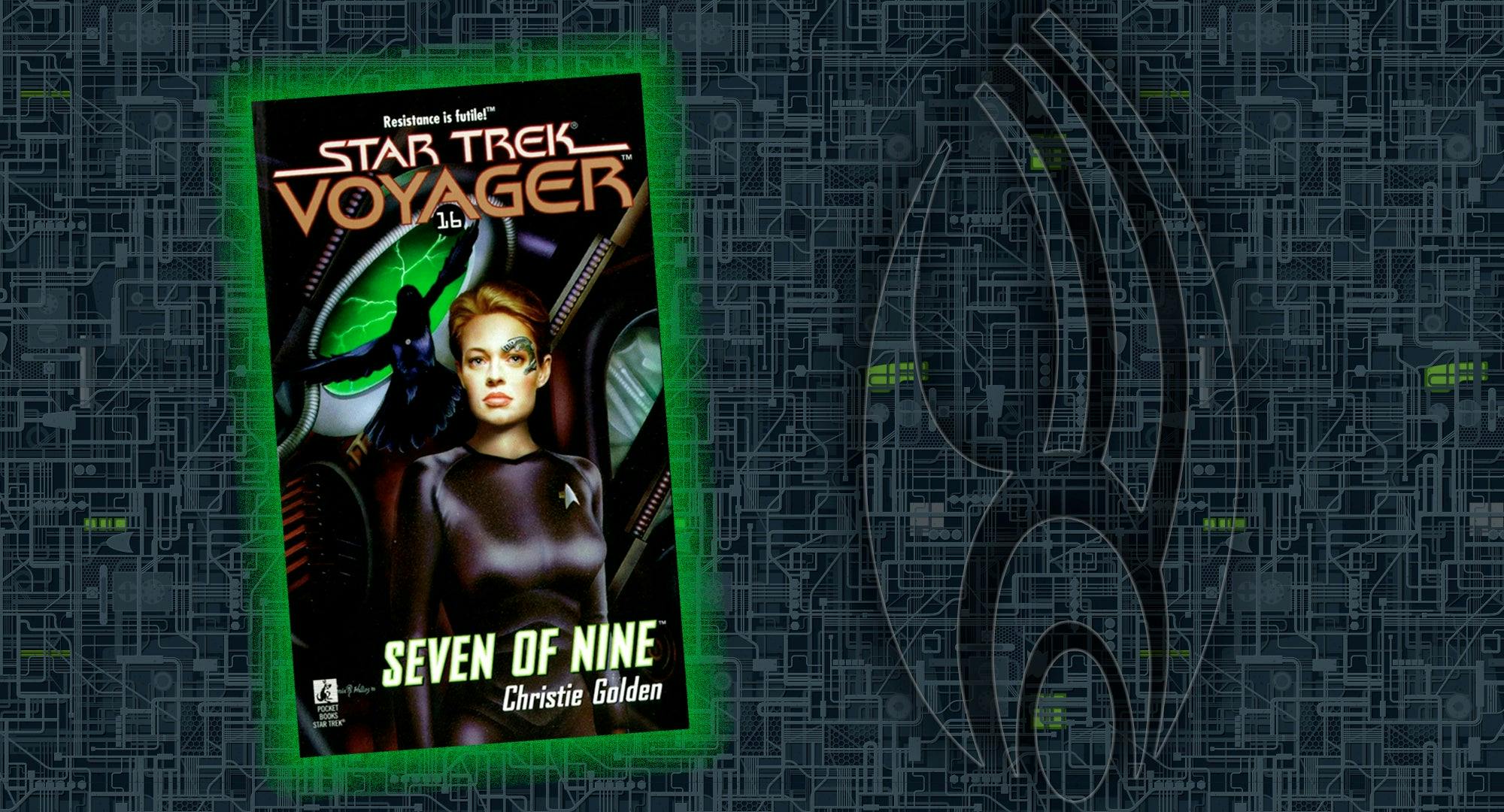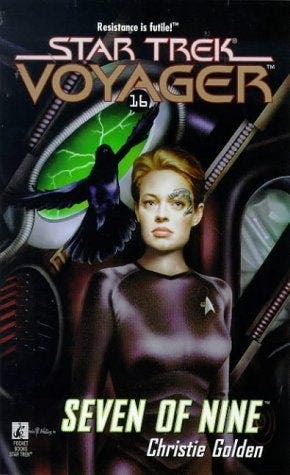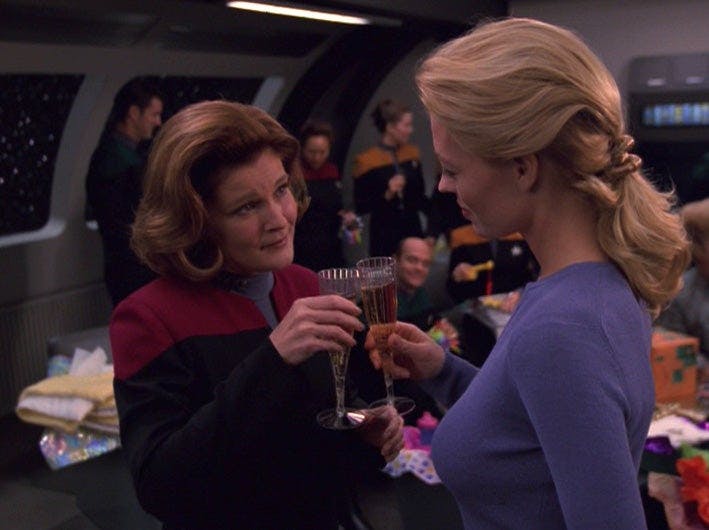Published Nov 6, 2019
This Novel is the Perfect Reintroduction to Seven of Nine
One fan's argument for revisiting the former Borg's eponymous 1998 novel before 'Star Trek: Picard'

StarTrek.com
Midsummer at San Diego Comic-Con, the long-awaited trailer for Star Trek: Picard was released first to the avid sci-fi fans packed into Hall H, and then to the world. Excitement for Picard was everywhere, yet for many of us diehard Star Trek: Voyager fans, a certain five second scene in the middle stood out as the most captivating.
Her loaded delivery of “What the hell are you doing out here Picard?” marked the first new footage of Seven of Nine (Jeri Ryan) fans had seen in over eighteen years. Yet, some of those fans might be delighted to know that in the literary world, the life of their favorite ex-Borg drone and her escapades in the Delta quadrant have been fleshed out in much greater detail.
In both the Comic-Con trailer and the newly released second trailer, Seven seems to have made leaps and strides in regaining her humanity —something that would warm both Admiral Janeway’s heart and the Doctor’s subroutines. But, what about the days before Voyager’s triumphant return to Earth? Before Seven learned to dream again in cargo bay 2? Before her link to the collective was severed? It’s important to remember that Seven of Nine, Tertiary Adjunct of Unimatrix O1, lived a long life as a Borg drone. Christie Golden’s novel Seven of Nine (Star Trek: Voyager) revisits these days, as the loved ones of the individuals Seven helped assimilate into the Collective return with a vengeance that endangers all of Voyager. And, for my money, Golden’s Seven of Nine is the perfect way to reintroduce yourself to Seven of Nine.

StarTrek.com
The tie-in novel sees Voyager traversing a region of space rife with civilizations that have fallen to, or been decimated by, the Borg. The novel is a conceptual sequel to the season four episode, “The Raven,” and is set shortly after Seven’s addition to the crew of Voyager. An alien dictatorship, The Lhiaarian Empire, struggles to maintain its hold over a region so vast that Lt. Tom Paris refers to it as, “the biggest piece of claimed space he’s ever seen.” A race of telepaths, the Skedans, have been all but eradicated by the Borg and abandoned by the empire in their time of need. In an attempt to mask their responsibility for the deaths of thousands, Emperor Bytek of the Lhiarrian Empire has ordered the assassination of the surviving Skedans, who (of course) take refuge aboard the U.S.S. Voyager.
Despite the refuge offered aboard Voyager, the Skedans still find a threat among the crew: Seven of Nine. They’re too devastated by the loss of their homeworld and nearly all of their people to view Seven as anything other than Borg, and a threat. The Skedans conclude that she should answer for the atrocities she committed while she was part of the collective. With their telepathy, they begin to torment her with dreams and hallucinations of people she was involved in assimilating.
The novel sees Seven of Nine grappling with her humanity and navigating her blossoming relationships with the crew of Voyager; a much different Seven, it seems, than has been featured in the trailers for Star Trek: Picard. Much of the impact from Seven’s character stems from the navigation of her newfound humanity and individuality. She undergoes significant character development throughout her four seasons on Voyager, which allow her to engage in such integrally human acts as pursuing interpersonal and romantic relationships, and even eventually uses the holodeck in season seven's “Human Error” to practice such things as mingling with her crewmates and delivering a toast. These aspects of her characterization, taken into consideration with her exceptional combat abilities and extreme proficiency in astrometry, make for a truly complex character. In many ways, she is more capable and intelligent than the majority of Voyager’s crew, while simultaneously lacking aptitude in social pursuits many of her crewmates take entirely for granted.

StarTrek.com
Golden’s novel is an adept examination of this version of Seven of Nine—a woman that spent nearly her entire life in the collective, emerging into individuality to discover she is uncertain how to define herself. Seven is a woman who could give Vulcans a run for their money in logical debates, or stare down a Hirogen hunting party without flinching; she can wince at the thought of public speaking and requires thorough training in such activities as making friends. In these ways, Seven perfectly embodies this complex brand of character that challenges our concepts of humanity that the franchise had previously achieved with Spock (Lenord Nimoy) and Data (Brent Spiner).
It is a very different version of Seven of Nine than we’ve seen in the trailers for Star Trek: Picard. At the beginning of the new series, Voyager will have already been back in the Alpha Quadrant for about 20 years; Seven and the rest of the crew will have had two decades to build new lives for themselves. In particular, Seven seems to have grown exponentially as an individual—her humanity having become undeniably more apparent than the Borg aspects of her identity. Notably, her voice and diction seem to have become much less formal and monotonous; her attire has become much more casual and practical (though the catsuits were almost positively an attribute of Voyager’s producers sexualizing the character to bolster viewership). It also seems the post-Delta Quadrant life Seven has built for herself involves taking on a role similar to the role Voyager’s crew, and especially Admiral Janeway, fulfilled for her.
Personally, I hope that Seven will be working with the de-assimilation of Borg drones. As she is not wearing a Starfleet uniform in the Picard trailer, perhaps Seven is not an active member of Starfleet (as many theorized she would be following Voyager’s return to Earth)?

StarTrek.com
Whatever form her Picard reappearance takes, fans ought to familiarize themselves with the personal journey Seven had to take before becoming the woman we see in the trailers. Christie Golden’s Seven of Nine perfectly conveys this Seven—complete with all her apprehensions regarding individuality and fraternization. Moreover, the telepathic torment from the Skedans (a creation entirely of Golden’s) gives us a window into the very acts Seven is perhaps trying to make amends for. Seven of Nine gives us an in-depth view of Seven’s perspective and sense of guilt regarding her former life as a Borg drone; the novel will surely resonate well with her (perhaps redemptive) undertakings in Picard and will imbue her storyline with meaning that could otherwise be lost.
Jake Gallant (he/him) is a student at the University of Alberta and avid Trekkie, though being named after Jake Sisko assured both this and a career in writing. He has multiple works published through The Gateway, the University of Alberta’s Student Journalism Society. You can find him on Twitter and Instagram @MrJakeGallant.
Star Trek: Picard will premiere exclusively on January 23 on CBS All Access in the United States, in Canada on Bell Media’s CTV Sci-Fi Channel and OTT service Crave, and on January 24 Amazon Prime Video in more than 200 countries and territories
